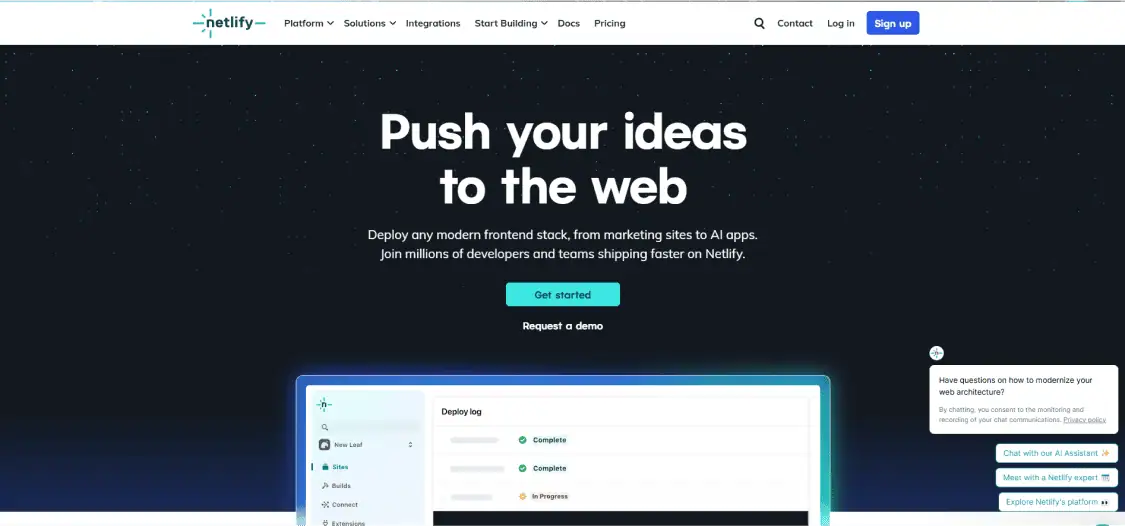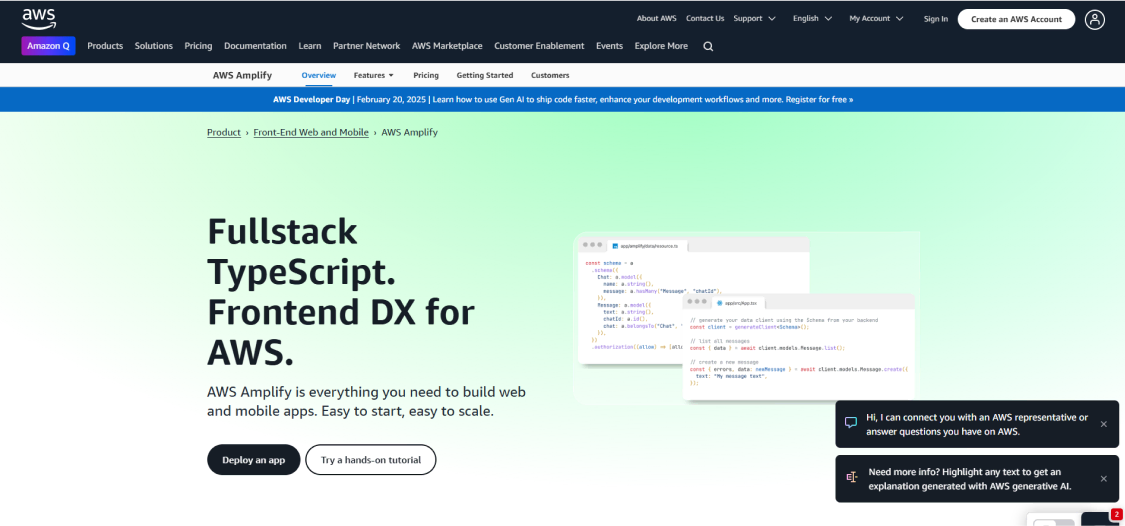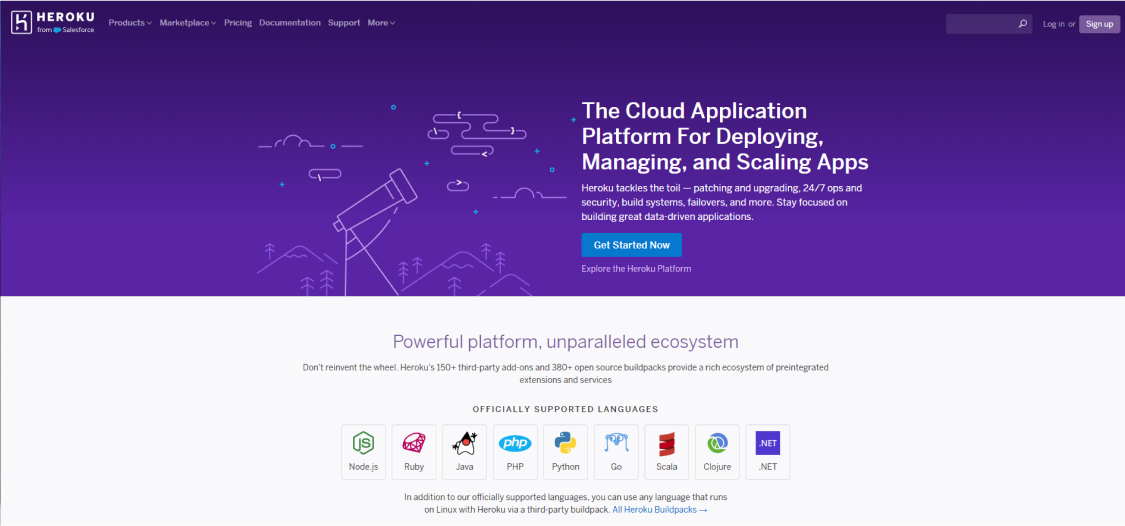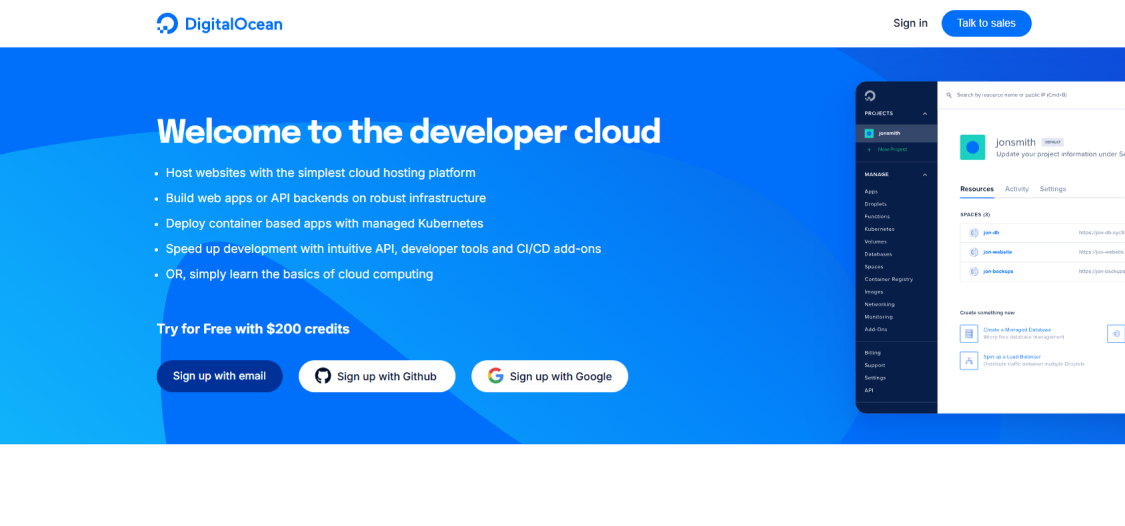Web developers need to keep up with new technologies. Next.js is a popular framework that helps developers make better web applications. But it's also essential to know how to host Next.js applications properly to make sure they work well and can handle many users.
For Next.js hosting, select providers catering to specific needs, particularly those tailored for Next.js e-commerce, Next.js websites, and Next.js headless CMS. This ensures applications meet current standards and adapt to emerging technologies, enhancing the user experience.
What is Next.js?
Next.js is a widely used framework for constructing React applications, seamlessly blending React's simplicity with server-side rendering (SSR) capabilities. Developed by Vercel, it stands out as an excellent choice for creating rapid and dynamic web applications. Next.js offers features such as next js middleware to enhance server-side logic and middleware functionality. Additionally, developers can leverage next js typescript for a strongly typed and scalable codebase, combining the benefits of TypeScript with Next.js.
Getting started is easy with the next.js install, allowing developers to quickly set up and deploy Next.js projects for efficient web development.
Key features of Next.js
Server-Side Rendering (SSR): Next.js can render pages on the server rather than in the browser. This results in faster initial page loads, improved SEO, and a better overall user experience.
Automatic Code Splitting: Next.js enables automatic code splitting, ensuring that only the necessary code for a specific page is loaded, reducing initial load times and optimizing performance.
Routing: With Next.js, routing is simplified. The framework provides a file-system-based routing mechanism, making it intuitive and easy to manage. The Next.js file structure follows a convention that aligns with this routing approach.
API Routes: Next.js allows the creation of API routes within the same project, streamlining the development of backend functionalities. While Next.js primarily focuses on web development, it can also be integrated with Next.js React Native for building mobile applications, providing a versatile solution for developers on both web and mobile platforms.
Also, it is essential for developers to stay updated with the Next.js latest version to leverage the newest features, improvements, and bug fixes introduced by the framework's maintainers.
What is Next.js Hosting?
Next.js hosting involves deploying and serving your Next.js applications on a server or a cloud platform, making them accessible to users over the internet. Hosting is a crucial aspect of the development lifecycle, influencing website performance, reliability, and scalability.
.
Key Features of Next.js Hosting
Server-Side Rendering (SSR) Support
- Next.js hosting platforms should provide robust support for SSR, ensuring that your application can take full advantage of server-side rendering capabilities.
- Fast and efficient SSR is essential for delivering content-rich pages with minimal latency.
Automatic Deployment
- A good Next.js hosting solution should offer seamless and automated deployment processes. This streamlines the deployment process, enabling developers to concentrate on coding rather than grappling with intricate deployment configurations.
Static Site Generation (SSG) Capabilities
- Next.js supports both SSR and static site generation. Hosting platforms should be equipped to handle static site generation, enabling the generation of pre-rendered pages at build time for optimal performance.
CDN Integration
- Content Delivery Networks (CDNs) are crucial in distributing assets globally, reducing latency, and improving page load times. Next.js hosting solutions often integrate with CDNs to enhance the delivery of static assets.
Serverless Architecture
- Next.js applications can benefit from serverless architectures, where the hosting platform automatically scales resources based on demand. This ensures cost-effectiveness and efficient resource utilization.
Environment Variables and Configuration
- Hosting platforms should support the management of environment variables and configuration settings, allowing developers to control various aspects of the application across different deployment environments.
Monitoring and Analytics
- Comprehensive hosting solutions often come with built-in monitoring and analytics tools. These features provide insights into application performance, user behavior, and potential issues that may arise.
Top Next.js Hosting Options
1. Vercel

- Vercel, the company behind Next.js, offers a hosting platform designed explicitly for Next.js applications.
- It provides seamless integration with Next.js projects, automatic deployment, and support for SSR and SSG.
- Vercel also offers global CDN support, ensuring optimal performance for users worldwide.
- The platform's intuitive dashboard and developer-friendly features make it a popular choice for Next.js hosting.
2. Netlify

- Netlify is a widely used platform for hosting static sites and serverless functions, making it an excellent choice for Next.js applications.
- It supports continuous deployment, automatic SSL certification, and seamless integration with Git repositories.
- Netlify provides serverless functions, allowing developers to build and deploy backend functionalities alongside their Next.js frontend.
3. AWS Amplify

- Amazon Web Services (AWS) Amplify is a comprehensive platform offering hosting, CI/CD (Continuous Integration/Continuous Deployment), and backend services for Next.js applications.
- Amplify supports automatic deployment from popular Git repositories, provides serverless backend functionalities, and integrates with AWS services for scalability.
4. Heroku

- Heroku is a cloud platform that streamlines the deployment process for a variety of applications, including those built with Next.js.
- It supports automatic deployment from Git, offers a scalable and managed infrastructure, and provides various add-ons for additional functionalities.
- Heroku's ease of use and quick setup make it a popular choice for developers looking for a hassle-free hosting solution.
5. DigitalOcean

- DigitalOcean is renowned for its straightforwardness and developer-centric approach. It offers Droplets and virtual private servers that can host Next.js applications.
- DigitalOcean provides straightforward deployment options, scalable infrastructure, and a variety of pre-configured images to get developers up and running quickly.
- The platform's competitive pricing and user-friendly interface make it an attractive choice for Next.js hosting.
Best Practices for Next.js Hosting:
- Optimize Images: Compress and optimize images to reduce file sizes and improve page load times. Next.js supports image optimization, and hosting platforms often integrate with CDNs to deliver pictures efficiently.
- Implement Caching Strategies: Leverage caching mechanisms to reduce server load and improve performance. Configure cache headers and utilize CDNs to cache static assets globally.
- Monitor Performance: Use monitoring tools to keep track of application performance, identify bottlenecks, and address potential issues promptly. Many hosting platforms offer built-in monitoring features.
- Implement Content Delivery Networks (CDNs): Integrate with CDNs to distribute static assets globally, reducing latency and improving the overall user experience.
- Environment Variable Management: Safely manage environment variables and configurations for deployment environments (development, staging, production) to ensure consistency and security.
- Automated Deployment: Set up continuous integration and continuous deployment (CI/CD) pipelines to automate the deployment process. This streamlines development workflows and reduces the risk of errors during deployment.
Security Measures: Implement security best practices, including secure communication (HTTPS), proper access controls, and regular security audits. Many hosting platforms provide features like automatic SSL certification.
Conclusion
Next.js hosting is a crucial aspect of deploying powerful and performant React applications. With the right hosting solution, developers can leverage the benefits of server-side rendering, automatic deployment, and scalable architectures to deliver exceptional user experiences. Whether you choose Vercel, Netlify, AWS Amplify, Heroku, DigitalOcean, or another hosting platform, the key is to align your hosting choice with the specific needs of your Next.js application. As the web development landscape evolves, staying informed about the latest hosting options and best practices will empower you to build and deploy cutting-edge web applications confidently.
When considering Next.js hosting, it's essential to explore the differences between Next.js vs Node.js and the comparison between Gatsby vs Next.js. Additionally, understanding the distinctions in functionality and use cases between Next.js and Express is crucial for making informed hosting decisions. Developers can make strategic choices that align with their project requirements and goals by evaluating the pros and cons of Next.js vs Node.js, Gatsby vs Next.js, and Next.js vs Express. Keeping abreast of these comparisons and staying informed about the evolving web development landscape will ensure that your Next.js applications are hosted optimally for performance and scalability.
For a seamless transition from development to deployment, consider partnering with experts who understand the complexities of Next.js hosting. Saffron Tech, a leading technology solutions provider, offers an advanced suite of services, including best cms for next js and hosting solutions for Next.js applications. Elevate your Next.js hosting experience with Saffron Tech – where innovation meets reliability.
Subscribe to Saffron Tech
Explore your marketing zen with our newsletter! Subscribe now.



